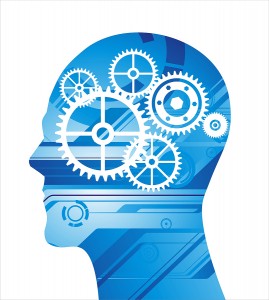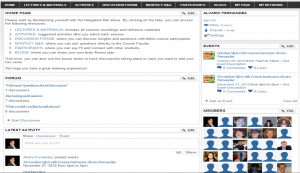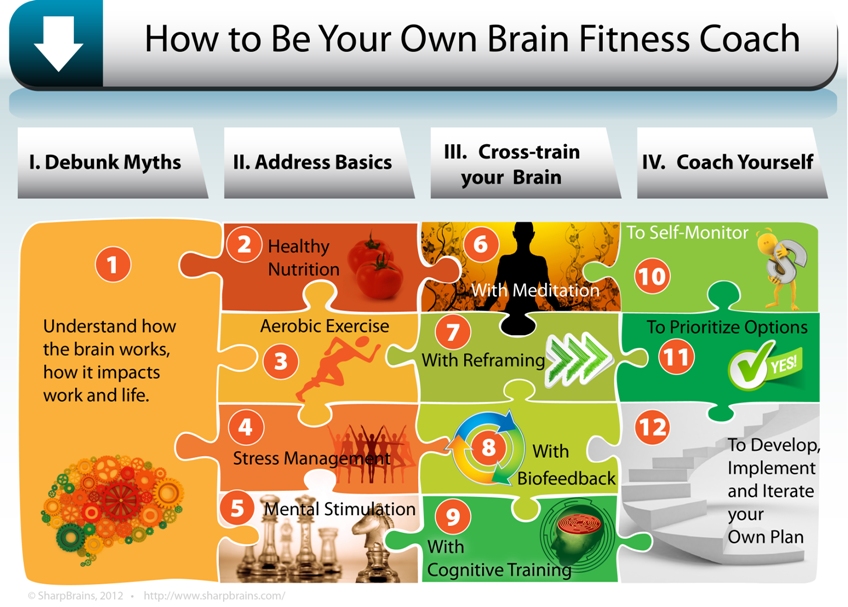Self-paced Course: How to Be Your Own Brain Fitness Coach ($75)
 Course Objective
Course Objective
By the end of this online course you will have gained the understanding and information required to apply emerging science and tools to enhance your own brain health and functionality across the lifespan.
Registered participants can log into the course here, and gain access to four recorded lectures–each lasting two hours– and to online materials and discussions.
- Session I. Debunking Brain and Brain Fitness Myths.
- Session II. How to Address the Basics.
- Session III. How to Build Brain-Based Capacities.
- Session IV. How to Be Your Own Brain Fitness Coach.
Course Description
 Summary: Information overload and longer lives expose our brains to more demands than even before. This self-paced and interactive online course will examine the emerging science of neuroplasticity and cognitive reserve and survey latest tools and best practices to equip you to become your own ‘brain fitness coach’ and address your very own priorities in your personal and/ or professional life. Available online from anywhere with an Internet connection, this course will help you pinpoint ways to optimize brain health and functionality and delay decline, navigating the maze of fragmented research, superficial media coverage and exaggerated marketing claims. The course is based on The SharpBrains Guide to Brain Fitness –recently named a Best Book by AARP– and SharpBrains’ new ABBC framework (Address Basics, Build Capacities), and includes weekly readings and activities.
Summary: Information overload and longer lives expose our brains to more demands than even before. This self-paced and interactive online course will examine the emerging science of neuroplasticity and cognitive reserve and survey latest tools and best practices to equip you to become your own ‘brain fitness coach’ and address your very own priorities in your personal and/ or professional life. Available online from anywhere with an Internet connection, this course will help you pinpoint ways to optimize brain health and functionality and delay decline, navigating the maze of fragmented research, superficial media coverage and exaggerated marketing claims. The course is based on The SharpBrains Guide to Brain Fitness –recently named a Best Book by AARP– and SharpBrains’ new ABBC framework (Address Basics, Build Capacities), and includes weekly readings and activities.
Mechanics: The course consists of four recorded two-hour-long lectures, and an online private community for participants to access all materials and to interact.
Who this is for
This course is open to the general public, and ideal for anyone with at least a bachelor’s degree (in any field) who wants to understand how emerging brain and cognitive science can be applied to enhance one’s brain health and performance. This is neither an oversimplified self-help course, nor a very technical/ medical one.
Instructor and Guest Lecturers
 Instructor: Alvaro Fernandez is the cofounder of SharpBrains, an independent market researcher and think tank helping organizations and individuals navigate applied neuroscience, and the coauthor of The SharpBrains Guide to Brain Fitness: 18 Interviews with Scientists, Practical Advice, and Product Reviews, to Keep Your Brain Sharp, recently named a Best Book by AARP. He is a nationally-known speaker and expert, quoted by The New York Times, The Wall Street Journal, New Scientist, CNN, and other media outlets. Alvaro also produces the largest annual global and virtual conference where scientists, technologists and professionals discuss latest developments in the field. Alvaro holds an MBA and an MA in Education from Stanford University, and was recently named a Young Global Leader by the World Economic Forum.
Instructor: Alvaro Fernandez is the cofounder of SharpBrains, an independent market researcher and think tank helping organizations and individuals navigate applied neuroscience, and the coauthor of The SharpBrains Guide to Brain Fitness: 18 Interviews with Scientists, Practical Advice, and Product Reviews, to Keep Your Brain Sharp, recently named a Best Book by AARP. He is a nationally-known speaker and expert, quoted by The New York Times, The Wall Street Journal, New Scientist, CNN, and other media outlets. Alvaro also produces the largest annual global and virtual conference where scientists, technologists and professionals discuss latest developments in the field. Alvaro holds an MBA and an MA in Education from Stanford University, and was recently named a Young Global Leader by the World Economic Forum.
 Guest Lecturer: Alvaro Pascual-Leone, MD, PhD, is the Director of the Berenson-Allen Center for Non-Invasive Brain Stimulation and a Professor of Neurology at Harvard Medical School. Dr. Pascual-Leone researches the physiology of higher cognitive functions with emphasis on the study of brain plasticity in skill acquisition and recovery from injury across the lifespan. Dr. Pascual-Leone obtained an M.D. and a Ph.D. in Neurophysiology from the Faculty of Medicine of Albert Ludwigs University in Germany, and trained at the University of Minnesota and the US National Institutes of Health. He greatly enjoys teaching and is the recipient of numerous awards.
Guest Lecturer: Alvaro Pascual-Leone, MD, PhD, is the Director of the Berenson-Allen Center for Non-Invasive Brain Stimulation and a Professor of Neurology at Harvard Medical School. Dr. Pascual-Leone researches the physiology of higher cognitive functions with emphasis on the study of brain plasticity in skill acquisition and recovery from injury across the lifespan. Dr. Pascual-Leone obtained an M.D. and a Ph.D. in Neurophysiology from the Faculty of Medicine of Albert Ludwigs University in Germany, and trained at the University of Minnesota and the US National Institutes of Health. He greatly enjoys teaching and is the recipient of numerous awards.
 Guest Lecturer: Robert M. Bilder, PhD, ABPP-CN is the Michael E. Tennenbaum Family Professor of Psychiatry and Biobehavioral Sciences at the UCLA David Geffen School of Medicine. Dr. Bilder is also the Chief of Medical Psychology-Neuropsychology at the Semel Institute for Neuroscience and Human Behavior, directs the Tennenbaum Center for the Biology of Creativity; is Co-Director of an NIMH-sponsored Center for Intervention Development and Applied Research focusing on translational research to enhance cognitive control.
Guest Lecturer: Robert M. Bilder, PhD, ABPP-CN is the Michael E. Tennenbaum Family Professor of Psychiatry and Biobehavioral Sciences at the UCLA David Geffen School of Medicine. Dr. Bilder is also the Chief of Medical Psychology-Neuropsychology at the Semel Institute for Neuroscience and Human Behavior, directs the Tennenbaum Center for the Biology of Creativity; is Co-Director of an NIMH-sponsored Center for Intervention Development and Applied Research focusing on translational research to enhance cognitive control.
.
.
- All you need is a computer with Internet access
Materials
Course registration includes:
- Access to four recorded course sessions and to an online library with resources
- A private online community to enable students to interact
Syllabus
Session I. Debunking Brain and Brain Fitness Myths: We will first debunk popular misconceptions that stand in the way of making informed decisions to spend our time and money wisely. We will explore hot topics such as genetics vs. environment vs. lifestyle, intelligence, left/ right brain hemispheres, “brain age”, cognitive enhancement, supplements, learning styles, brain training, neurogenesis, neuroplasticity, cognitive reserve, and Alzheimer’s Disease. Additionally we’ll contrast the findings from a major recent scientific study with their media coverage, equipping participants to become better informed readers of news and scientific findings.
Reading:
- Introduction, Chapter 1 and 2 of The SharpBrains Guide to Brain Fitness
- Agency for Healthcare Research and Quality (AHRQ). 2010. Alzheimer’s Disease and Cognitive Decline, Structured Abstract and Evidence Report. April 2010. www.ahrq.gov/clinic/tp/alzcogtp.htm
Session II. How to Address the Basics: In this session we will discuss the complementary roles and mechanisms underpinning the major lifestyle pillars for brain fitness: healthy nutrition, aerobic exercise, stress management and mental stimulation that incorporates novelty, variety and challenge. We’ll explore how the human brain is a dynamic system to optimize and enhance, and how each of the major lifestyle pillars plays a fundamental role in developing, enhancing, and maintaining key cognitive, executive and emotional self-regulation functions require to thrive at every stage of life (“brain fitness”).
Reading:
- Chapters 3–6 of The SharpBrains Guide to Brain Fitness.
Activity: five-finger meditation.
 Session III. How to Build Brain-Based Capacities: What are some of the most promising research-based “brain training” methods (hint: meditation, cognitive training, biofeedback, cognitive therapy) and what are emerging best practices and guidelines on how and when to use each of them to build core capacities such as attention, working memory, emotional self-regulation, information processing, cognitive monitoring and reappraisal? This session will survey the value and limitations of available tools and suggest appropriate scenarios of use.
Session III. How to Build Brain-Based Capacities: What are some of the most promising research-based “brain training” methods (hint: meditation, cognitive training, biofeedback, cognitive therapy) and what are emerging best practices and guidelines on how and when to use each of them to build core capacities such as attention, working memory, emotional self-regulation, information processing, cognitive monitoring and reappraisal? This session will survey the value and limitations of available tools and suggest appropriate scenarios of use.
Reading:
- Chapters 7 and 8 of The SharpBrains Guide to Brain Fitness.
Activity: participants choose biofeedback-based exercise or cognitive training.
Session IV. How to Be Your Own Brain Fitness Coach: This session will equip you with the frameworks and checklists required to integrate the knowledge and tools introduced during the whole course to meet your specific personal and professional priorities. “No one size fits all” applies to brain fitness, and this course is designed to help you build your own personal “brain fitness toolkit” to meet the priorities you are facing today and will face tomorrow.
Reading:
- Chapter 9 of The SharpBrains Guide to Brain Fitness.
Activity: develop your own “brain fitness plan.”
Top 40 Questions Addressed by the Course
Here are 40 common brain fitness and brain training questions that will get answered during the course, sequenced by their approximate order of appearance in the syllabus.
- How can one define brain fitness
- What is link between stress, focus and memory
- Does “brain age” even exist
- How to enhance overall mental productivity, vs just IQ
- Is there some “ceiling” to my improvement or can I always try more things
- How brain functions evolve with age. What improves, what declines, what should I be paying attention to
- Can lifelong learning delay dementia
- What are specific guidelines to lead a lifestyle that maximizes brain fitness
- How to increase my chances to avoid Alzheimer’s Disease
- How do I know what is part of the normal aging process and what isn’t
- What are the main pillars to enhance cognition, and how do they work
- What are the “active ingredients” for experiences to build new neural pathways
- Are dietary supplements beneficial? How does nutrition and exercise improve cognitive skills?
- What is the state of the science of cognitive fitness? What types of claims make sense?
- Can videogames protect from dementia
- Does stress kill neurons?
- Can we increase the capacity/ plasticity of the brain?
- What are the best preventive steps that can be taken today to maintain brain health over many years?
- What are the types of activities shown to build cognitive reserve
- How can brain training principles can be APPLIED to everyday work and life and learning, not just while doing programs
- Can I improve memory and focus capabilities
- What’s the best evidence for what helps in brain training
- How can I train my brain to focus/concentrate more when I need to focus/concentrate and shut down when I need to or want to sleep
- How to effectively use new products to improve brain function. How do I choose between product A or B?
- How brain training works and the benefits we can expect to receive from it
- How can I evaluate whether the claims are evidence-based
- Is meditation better than yoga for the brain?
- How does brain training generalize to every day life? Is there research to support claims?
- How I can prevent age-related cognitive deterioration/ loss/ dementia
- How to enhance mental flexibility?
- How do I measure progress and results? How can I track that what I try really works?
- How I go about being my own Brain Fitness Coach
- How do I get started?
- How to evaluate whether real change has occurred?
- How to set up a consistent practise with say 20 minutes everyday
- Will any of this help me at work? How?
 How can the average person develop and self-manage a structured coaching plan in all phases of life that is valid and a good time investment
How can the average person develop and self-manage a structured coaching plan in all phases of life that is valid and a good time investment- What are the three or four things one can do on a daily basis to improve health and prevent impairment with age?
- What can I do in my everyday experiences to keep my brain in great condition, as I have/had several cases of dementia and Alzheimer’s in my family?
- How do I know what’s my baseline and how do I track/maintain positive progress over time?
Common Questions & Answers About the eCourse
Q: Do I need a PayPal account to pay for the course?
A: No. You can pay with your credit or debit card (VISA, MasterCard, American Express, Discover), or you can log in to your PayPal account if you already have one.
Q: How many hours may it take me to complete the course?
A: Around 10–12 hours total. The four lectures, combined, last 8 hours, and we recommend at least 2–4 hours to go through readings, activities, discussions…
 Q: Can I download the lectures?
Q: Can I download the lectures?
A: No, they can only be streamed/ watched online.
Q: How can I learn more after watching the lectures?
There are multiple resources available via the eCourse platform (see image). You can click on the Activities tab in the navigation bar and find activities to perform after watching each session. You can also read the additional resources available in the Lectures & Materials tab, and discuss your impressions and open questions with other course participants at the Discussion Forum.
Q: How do I know who else is taking or has taken the course and how do I interact with them?
You can “meet” other participants and interact with them via the Participants and Discussion tabs.
If you have any other questions or would like further details about the course please Contact Us.


